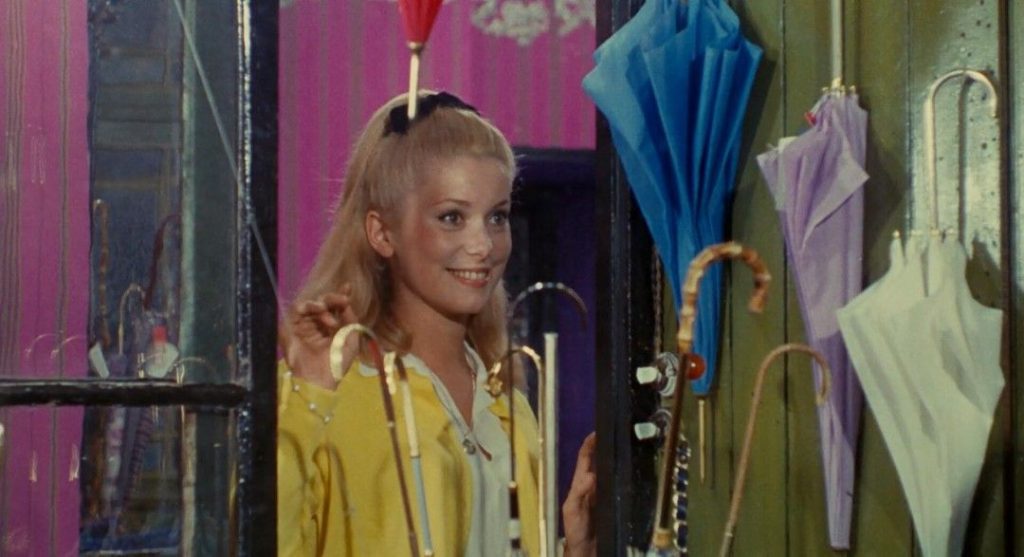
At the 1964 Cannes film festival a jury headed by the German master of noir, Fritz Lang, selected Jacques Demy’s vibrantly colorful and touchingly romantic musical as the winner of the palme d’or. This was the first of three musicals to win that coveted prize. In my opinion, it is not only the best of those three, but one of the greatest triumphs of music, cinematography, and storytelling ever committed to film.
The simplicity of the story is what gives The Umbrellas of Cherbourg its appeal, because that simplicity is what enables Demy to tell a story that is a simultaneous love-letter and critique of the stereotypical musical. The story is a basic musical romance: girl and boy meet and are hopelessly smitten with one another. Her mother disapproves and wants her to marry a considerate rich guy for security. The boy is called away (drafted), and she is heartbroken and begins to consider the rich guy’s proposal despite a major caveat.
Guy and Genevieve (Nino Castelnuovo and Catherin Deneuve) are the young boy and girl hopelessly smitten with their love for one another. They croon “I Will Wait for You” as Guy is drafted, which becomes the main theme of Michel Legrand’s sumptuous and jazzy score. This song is a beautiful testament to the enduring power of love, but what the film poignantly asks is “What if that love doesn’t last?”
It’s an ironic question to ask given that “I Will Wait for You” is the recurring theme throughout the film, but it is a question that underscores the difference between love and infatuation. Guy and Genevieve’s affection unquestionably extends beyond infatuation, so why did their love not conquer all obstacles?
The musical is an inherently bad medium for telling a story, as are both of its predecessors—opera and vaudeville. Song and dance numbers slow down a plot tremendously (or stop it completely). No one sings their emotions in public; no one has a change of heart over one song. Yet these things happen in musicals all the time. In order to work within these genre confines, plots are often short and simple, and given the vaudeville side of the musical’s origins, the plots have some sort of conflict that is often unrealistically resolved.
With those origins and along with the cultural mores during the musical’s rise, identifying “problematic” musicals is like shooting fish in a barrel. The Umbrellas of Cherbourg addresses that, both in the love of Guy and Genevieve for each other and in the love that it has for the musical genre itself.
Loves that are strong and deep enough never completely die, even if they are betrayed and hurt. Sometimes those are first loves, as in the case of Guy and Genevieve, other times they come later in life. As the bittersweet ending makes so strongly and beautifully apparent, Guy and Genevieve’s love is as fundamental to their lives as the film’s love is to the musical genre. The concrete evidence of both those loves is the young witness to the final scene and the film’s rich knowledge of how musicals work, which led to its own creation.
Turning to art to lift our spirits or comfort us is an ancient human practice, and the musical emerged as a means of combining various forms of art. Naturally, many early musicals had conventional happy endings. What The Umbrellas of Cherbourg asks is how healthy those happy endings really were and whether they could truly satisfy us or only pave the way for something greater.
Guy and Genevieve’s love could be an example of true love as found in a fairytale, or it could be the beginning of a journey. The film provides an answer through Legrand’s score and its main theme of “I Will Wait for You,” although it may not be the answer viewers expect. That first love will always wait for the protagonists, and even when they think it is gone, it is still there.
One final consequence of the simplistic plots inherent to most musicals is that the score has to become a character to do the emotional heavy-lifting, and Legrand’s score does just that. As the film opens with a God’s point of view shot of French civilians hurrying through a rainstorm with their umbrellas, the love theme slowly emerges in counterpoint, and the orchestrations prominently feature a sustained vibraphone to capture the watery atmosphere. When Guy returns from the army, it is again raining, and this time the love theme is played by the winds and marimba tremolos to suggest a deeper, darker rain washing over his past romance, which still haunts him as much as he would wish to forget it.
The synchronization of music and visuals is perfect throughout the film. In my mind, it rivals Singin’ in the Rain for one of the best marriages of music and imagery. This level of sheer perfection gives emotional weight not only to the music, but the story itself. A simple tale of first love centered around an umbrella shop ends up containing much wisdom about art and life, if only we know how to listen for it and see it.
—Evalyn Cogswell (2022)
- Directed by: Jacques Demy
- Produced by: Mag Bodard;
- Written by: Jacques Demy
- Music by: Michel Legrand
- Cinematography by: Jean Rabier
- Editing by: Anne-Marie Cotret; Monique Teisseire
- Release Date: 1964
- Running time: 91 minutes.
- Language: French; English
Arts & Faith Lists:
2022 Top 25 Movie Musicals — #4